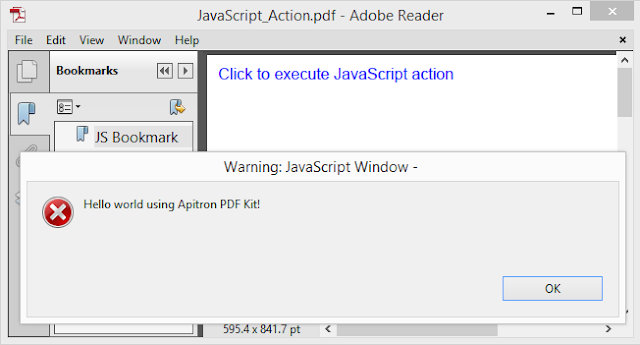Introduction
In our latest post we’ve explored all possible ways to use links in PDF and promised to write an additional post about pdf actions. As you may recall, we used Destination objects for setting the targets of our links. Another way to get job done and extend the range of possible usages is to use Actions. They are described in section 12.6 “Actions” of the pdf specification and provide an alternative way to add interactivity to your documents.
In addition to jumping to a destination, actions can be used to launch application, execute Adobe JavaScript, play sound, change annotation’s appearance state, etc.
All available action types are listed below:
- GoTo - go to a destination in the current document
- GoToR - (“Go-to remote”) go to a destination in another document
- GoToE - (“Go-to embedded”) go to a destination in an embedded file
- Launch - launch an application, usually to open a file
- Thread - begin reading an article thread
- URI - resolve a uniform resource identifier
- Sound - play a sound
- Movie - play a movie
- Hide - set an annotation’s Hidden flag
- Named - execute an action predefined by the conforming reader
- SubmitForm - send data to a uniform resource locator
- ResetForm - set fields to their default values
- ImportData - import field values from a file
- JavaScript - execute a JavaScript code
- Rendition - controls the playing of multimedia content
- Trans - updates the display of a document, using a transition dictionary
- GoTo3DView - sets the current view of a 3D annotation
Actions can be assigned to annotations objects and outline items (“bookmarks”), see the code sample provided in the next section.
Code sample
Below is the slightly modified code sample from the post about links, its only difference is the use of Action object instead of Destination. It creates a bookmark and a link both having the same JavaScript action assigned. This action shows a simple message box with “hello world” message.
publicvoid CreateLinkAndBookmarkWithJavaScriptAction()
{
// create pdf document
FixedDocument doc = newFixedDocument();
// create javascript action, showing the message box
Action action = newJavaScriptAction("app.alert('Hello world using
Apitron PDF Kit!');");
// add a bookmark for second page
doc.Bookmarks.AddFirst(newBookmark(action, "JS Bookmark"));
// add first page with text link
Page firstPage = newPage();
// add link text
TextObject linkTextObject = newTextObject();
linkTextObject.AppendTextLine("Click to execute JavaScript action");
firstPage.Content.SaveGraphicsState();
firstPage.Content.SetDeviceNonStrokingColor(RgbColors.Blue.Components);
firstPage.Content.Translate(10, 820);
firstPage.Content.AppendText(linkTextObject);
firstPage.Content.RestoreGraphicsState();
// add link annotation covering the text
LinkAnnotation link = newLinkAnnotation(newBoundary(10, 815, 230, 835));
link.BorderStyle = newAnnotationBorderStyle(0);
link.Action = action;
firstPage.Annotations.Add(link);
// append pages
doc.Pages.Add(firstPage);
// save document
using (Stream stream = File.Create("JavaScript_Action.pdf"))
{
doc.Save(stream);
}
}
See the image below showing the results of clicking the link with assigned action.
It’s easy and simple as it should be. If you’d like to read more about Adobe’s JavaScript implementation, read the following book - “JavaScript™ for Acrobat® API Reference”.
Conclusion
As you can see, our product, Apitron PDF Kit for .NET, can be used to add interactivity to your pdf documents with unmatched ease and clearness. Using its API you’ll be able to: create links, actions and bookmarks, create or modify pdf forms, and much more. Read our free book, or contact our support if you have any questions regarding its capabilities.
Downloadable version of this article can be found by the following link [PDF].
Downloadable version of this article can be found by the following link [PDF].


















